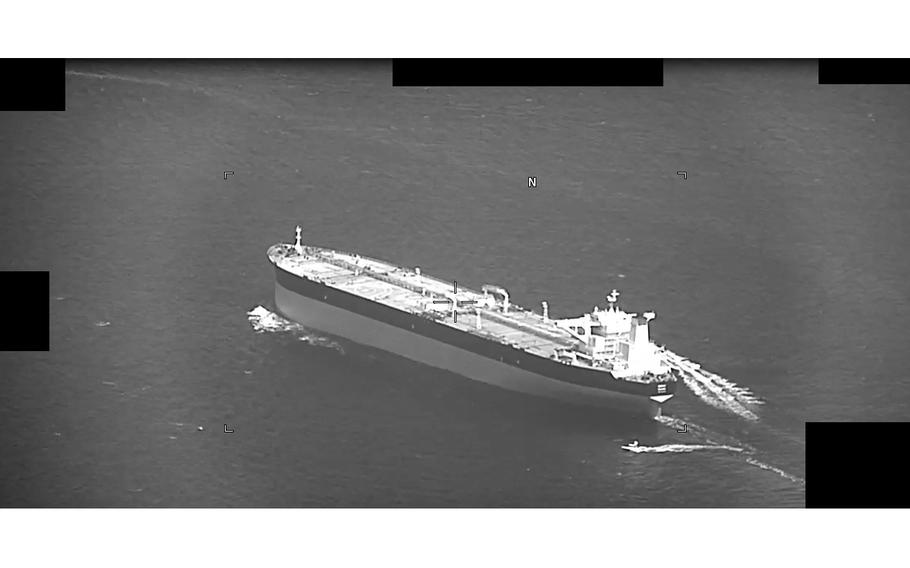
A screenshot of a video shows fast-attack craft from Iran’s Islamic Revolutionary Guard Corps navy approaching the Panama-flagged oil tanker Niovi as it transits the Strait of Hormuz on May 3, 2023. (U.S. Navy)
U.S. military intervention is unlikely should Iran seize yet another oil tanker, but Washington is eager to demonstrate to Persian Gulf countries that it remains a force in the region, analysts say.
It is typically the Pentagon that responds first to incidents such as Iran’s purported commandeering of the Panama-flagged oil tanker Niovi on Wednesday in the Strait of Hormuz.
Instead, U.S. Naval Forces Central Command/U.S. 5th Fleet released the first statement of condemnation, along with video they said showed Iranian military boats swarming and seizing the tanker.
The fleet also took the lead last week when Iranian navy commandos seized a Marshall Islands-flagged tanker in the Gulf of Oman.
The Biden administration is frustrated with rhetoric that the U.S. considers the Middle East less strategically important than it did previously and is withdrawing from the region, said Will Todman, a fellow with the Washington, D.C.-based think tank Center for Strategic and International Studies.
Putting the Bahrain-based Navy command at the forefront of the response sends a message to U.S. partners in the region to reassure them of continuing American commitment.
“Although, clearly, that presence has not deterred Iran from taking both of these tankers,” Todman said.
The Navy also has increased the visibility of its regional drug and weapons busts, which it conducts alongside partners and allies as part of task forces headquartered in Bahrain. The smuggling rings are often linked to Iranian proxy groups, the Navy has said.
However, Iran is likely to remain undeterred despite those efforts, said Michael Pregent, a senior fellow at the Hudson Institute in Washington, D.C.
It may take a credible show of force, such as firing warning shots when Iran attempts to seize a ship or steer it into its territorial waters, Pregent said.
“I don’t see that happening,” said Pregent, who noted that Iran has not faced consequences, such as additional sanctions, for its actions. “The administration doesn’t want to escalate right now.”
The U.S. also has beefed up patrols in the region and highlighted the presence of an Ohio-class submarine carrying Tomahawk missiles, which is something the Navy rarely announces.
But Iran knows the U.S. won’t fire missiles into Iran or its Arab proxies, Pregent said.
“The more you flex that muscle and don’t use it, the more your adversary throws punches,” he said.
Iran wants concessions, such as the lifting of economic sanctions imposed by the U.S. in a bid to deny Tehran the funds to sponsor militant proxy groups in the region, among other reasons.
Iran also wants the return of a tanker carrying Iranian crude oil that reportedly was redirected away from China last week by the U.S. in an effort to enforce the sanctions, Pregent said.
The Justice Department said Wednesday that it had no comment regarding reports it had redirected the tanker.
Also on Wednesday, the Navy said Iran has harassed, attacked or interfered with the navigational rights of 15 internationally flagged merchant vessels over the past two years.
Iranian authorities say they're enforcing punishment of maritime infractions. They accused the tanker seized last week, the Advantage Sweet, of crashing into another ship. The company operating the tanker said it had no knowledge of such a collision.
The Niovi was seized because of a private complaint winding through Iranian courts, a report by the state-run Islamic Republic News Agency said Wednesday.
But some analysts think the seizure of the Niovi might have been staged by Iran. The ship was not carrying any cargo at the time, and it has a history of being used to skirt sanctions by receiving Iranian oil. Leaked emails suggest that the Niovi’s seizure is connected to a legal dispute with a company sanctioned by the U.S. government, Claire Jungman, chief of staff at the nongovernmental organization United Against Nuclear Iran, tweeted Wednesday.
The emails were posted on Wikiran, a leak site about Iran. They say ASB Group, which is affiliated with the sanctioned company Baslam Nakliyat, was in a dispute with Marshall Islands-based La Mere Maritime, over cargo allegedly sold without approval, Tomer Raanan, senior reporter for the Lloyd’s List’s shipping journal, wrote in an article Thursday.
Baslam Nakliyat was added to the Treasury Department’s list of offenders Dec. 8, 2022, for evading U.S. sanctions against Iran, the agency said in a statement at the time.
Todman said Iran doesn’t want to be seen as weak and is drawing red lines to temper U.S. actions.
“It wants to maintain a defense that it is a threat, and it needs to be treated, in its eyes, with respect,” he said.